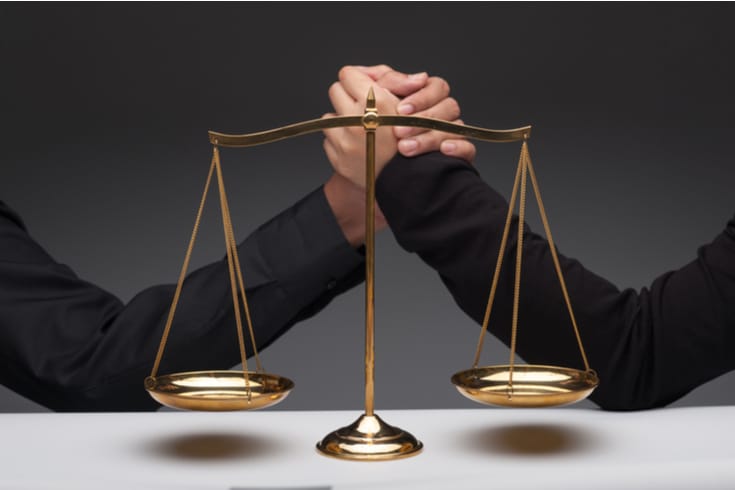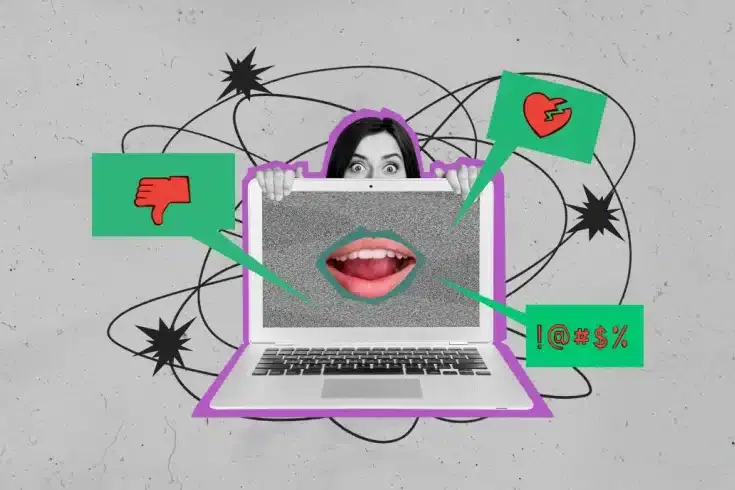Why Do Meta Accounts Suddenly Get Suspended or Frozen? Understanding Facebook and Instagram's Terms and Taking Precautions

For corporate accounts, influencers, and individual users alike, the suspension or freezing of a social media account poses a significant issue. When an account is suspended, companies can lose their means of communication, as well as sales and marketing channels, while influencers not only lose revenue and influence but also their connection with fans. Moreover, the criteria for account suspension on social media platforms are often opaque, and accounts can be suddenly stopped without any prior warning.
To avoid such situations, it is crucial to understand the risks beforehand and take appropriate measures.
This article will provide a detailed explanation of the terms and measures you should be aware of to mitigate the risk of social media account suspension, as well as specific guidelines for action.
Why Are Accounts Unilaterally Suspended or Frozen? The Structure of Meta’s Terms of Service
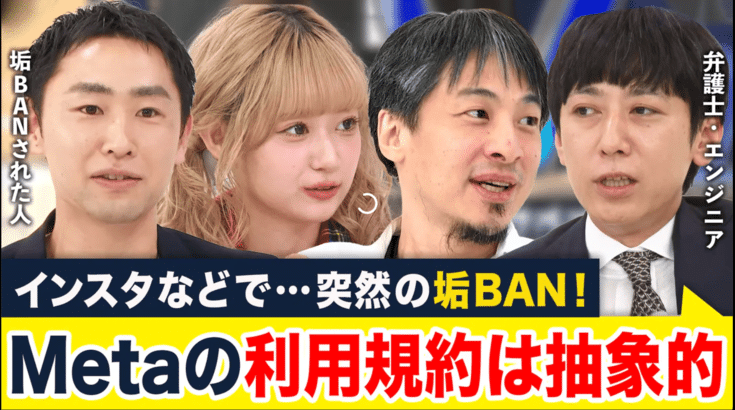
Account suspensions and freezes on Meta (Facebook and Instagram) are not arbitrary. They are typically carried out when there is a violation of the terms of service or community standards. The issue lies in the fact that the determination of this ‘violation’ is made at the broad discretion of Meta.
Account Suspension and Freezing and the Terms of Service of Facebook and Instagram
For example, Facebook’s terms of service state the following:
If there is a clear, serious, or repeated violation of our terms or policies, we may disable your account at our discretion.
There are three key points to note here:
- The scope of applicable regulations is very broad: There are multiple policies, including community standards, advertising policies, and branded content policies.
- The criteria for determining what constitutes a ‘serious’ violation are unclear.
- The decision is made at the discretion of Meta.
Similarly, Instagram’s terms of service (4.2.2, 4.2.3) also stipulate that account suspension is possible for reasons such as ‘illegal, fraudulent, or misleading activities’ or ‘policy violations’.
The Reality of Meta’s Community Standards
What’s more important is the specific content of the community standards. Meta’s guidelines include dozens of prohibited items, such as ‘child nudity,’ ‘spam,’ ‘violence and incitement,’ ‘misinformation,’ and they are updated daily.
Moreover, these are not always individually notified to users in advance, and it is often the case that Meta detects violations based on its own criteria and automatically takes suspension or freezing measures based on AI.
Why Are Accounts ‘Suddenly’ Suspended or Frozen?
As reported on social media, there are many cases where accounts are suspended or frozen without warning, known as ‘one-strike bans.’ This can occur not only due to an accumulation of violations but also when a single post is deemed a ‘serious violation’ or when a violation is mistakenly identified by machine judgment.
Under the terms, Meta is not obligated to provide prior warnings, and users often face the opacity of not knowing exactly ‘why their account was suspended or frozen.’
Thus, it is essential to understand that Meta’s account management is based on self-responsibility, assuming compliance with contracts and policies.
What Constitutes a Violation? Common Reasons for Facebook and Instagram Account Suspensions and Freezes

To prevent account suspensions, it is essential to have a concrete understanding of what may constitute a violation of Meta’s terms. Here, we will explain the common patterns of violations that are highly likely to lead to suspensions or freezes, focusing on specific examples of posts and behaviors.
Posting Child Nudity and Similar Content (Strict Stance on Content)
Meta’s community standards take an extremely strict stance on the sexual exploitation and abuse of children, as well as the posting of child nudity or sexual imagery. Even if there is artistic or educational intent, such content may be deemed a violation by AI or human judgment.
For instance, seemingly harmless images like family photos can be subject to deletion or suspension if they include a naked child. Photos of children in swimsuits or gravure-style expressions also carry a high risk.
Especially on Instagram, there is a tendency to identify violations based on broader criteria than the Japanese legal system (Child Pornography Prohibition Law), so it is important to note that “legal in Japan” does not necessarily mean “okay on SNS.”
Commercial Posts Flagged as Spam (Based on Number and Nature of Posts)
Meta does not prohibit “commercial use” itself. On the contrary, posts that are appropriately displayed as advertisements or branded content are widely accepted for business purposes.
However, the following cases may be judged as “spam,” increasing the risk of suspension or freezing:
- Repeating the same content in multiple posts
- Posts that are solely composed of product links, essentially only advertising
- Mass posting of the same content across multiple accounts
- Sales or solicitation activities in DMs or comment sections
- Excessive use of external links, abuse of shortened URLs
Meta has explicit regulations against “excessively frequent posting or sharing,” and algorithmically, patterns of behavior that are repetitive are easily detected mechanically. Therefore, particular caution is needed when conducting concentrated posting for campaigns or giveaway promotions.
Violent and Aggressive Expressions
Under Meta’s policies, there are provisions related to “violence and incitement,” and the following types of posts may be considered violations:
- Statements or images that threaten someone
- Content depicting violence, such as beating or bleeding scenes
- Extreme expressions at demonstrations or crime scenes (which may be judged as incitement)
As an exception, posts that “visualize social issues” or are for “journalistic purposes” may be accepted. However, proving this as an individual influencer’s post is extremely difficult. Using provocative language as a form of inflammatory marketing can actually increase the risk of account suspension.
Is “Suspension or Freezing Without Warning” Not Illegal? Terms of Service and Legal Precedents on Social Media in Japan
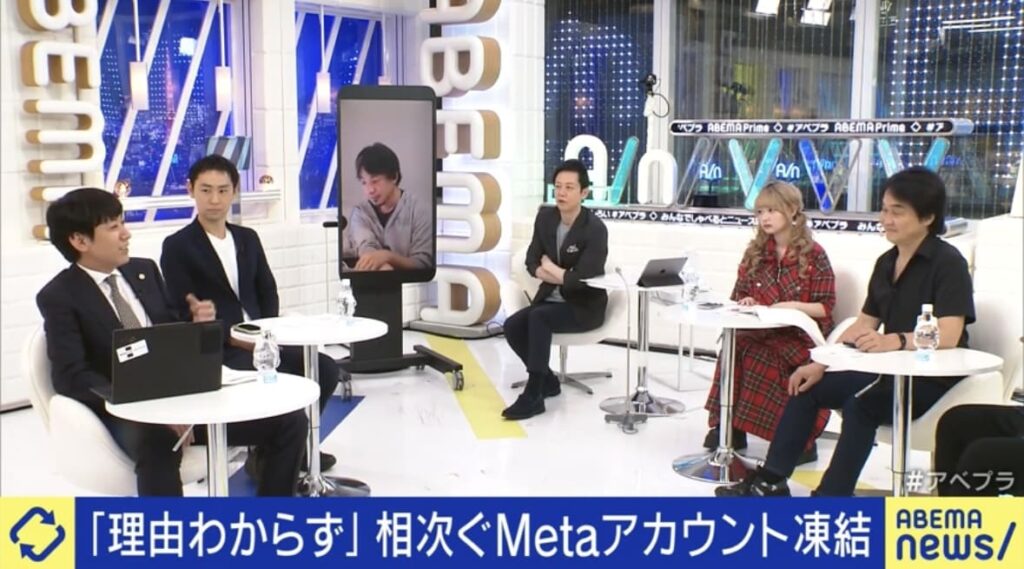
“My account was suspended without any warning,” “If only they had given me a notice first…” are common grievances. However, the reality is that social media platforms like Meta are not legally obligated to provide “prior warnings” to users.
Meta’s Terms of Service Allow for “Immediate Suspension or Freezing”
Meta’s terms of service do not have a clear obligation to “notify in advance,” and it states that Meta can immediately delete or suspend an account at its discretion upon confirmation of a violation. In other words, an “instant BAN” is a measure anticipated within the terms of service.
Moreover, not only for “clear violations,” but also in cases Meta deems as “serious” or “repeated” violations, account deletion or suspension measures for Facebook and Instagram can be taken regardless of the user’s intent.
Legal Cases in Japan Recognizing “No Obligation to Warn”
A relevant case is the Tokyo District Court’s decision regarding mixi (April 8, 2015 (Heisei 27), Hanji No. 2271, page 70). In this decision, although the user claimed that “suspending the account without prior warning was unfair,” the court ruled that there was no illegality in mixi’s response, as the terms of service did not stipulate a warning obligation and the violation was recognizable.
Meta’s terms and practices are similar, and even if users feel “dissatisfied,” in most cases, Meta’s actions of suspending Facebook and Instagram accounts without prior warning are legally justified.
In Other Words, Do Not Expect an “Explanation Responsibility” for Account Suspension or Freezing on Facebook and Instagram
For a global company like Meta, providing detailed explanations to individual users is not cost-effective or realistic. In fact, there are many instances where accounts are deleted with vague reasons, and even if objections are raised, they often end with template responses.
Therefore, as a user, it is more realistic to “ensure operation without violations” rather than “expect post-facto negotiations with Meta.”
What Constitutes Commercial Posts Likely to Be Flagged as Spam? Trends in Risks Through Real Examples

Commercial posting does not equal violation. In fact, many influencers carry out advertising campaigns and promote their own services on social media, which in itself is not directly linked to a breach of terms. The issue lies in the “manner” and “frequency” of the posts.
Common Spam Detection Patterns on Meta Platforms
On Meta platforms (Facebook & Instagram), even commercial posts can be at high risk of account suspension if the following patterns are repeated, as they may be flagged as spam.
Mass Posting of Identical Texts & Images
- Using a template for promotional messages and posting them multiple times a day in succession.
- Posting the same advertisement multiple times from different accounts (such as secondary accounts).
Example: Repeatedly posting the same image with the caption “This beauty serum will seriously change your life! No regrets in buying!” several times a day.
Sales Activities via DMs & Comments
- Leaving promotional comments like “Please check this out” on posts of followers or those found via tag searches.
- Mass distributing direct messages using automated sending tools.
Excessive Use of External Links
- The majority of posts contain URLs that encourage external navigation, such as “Buy here” or “Sign up via this link.”
- URL shortening services and certain affiliate links are particularly prone to being automatically detected.
Excessive Rollout of Campaign Posts
- Conducting a concentrated series of giveaway events or promotions where participation is through likes and follows within a short period.
- An excessive number of “follow-inducing actions” or “hashtag abuse” can easily be misidentified as spam by the algorithm.
Meta’s (Facebook & Instagram) Criteria Prioritize ‘Quantity Over Quality’
Under Meta’s community standards, actions that involve “posting or sharing at an extremely high frequency” are considered spam. What’s important here is not whether the content is beneficial, but whether the form is mechanical and repetitive. In other words, even if you manually post the same message, if it’s deemed ‘automated behavior,’ it’s out of bounds.
It’s common for companies and influencers to unintentionally use the same promotional template by multiple people, but this alone can trigger account suspension or freezing.
Measures to Avoid
- Always vary your post templates
- Incorporate at least three lines of natural text in promotional posts
- Don’t overuse hashtags (3 to 5 is a safe number)
- Limit calls to action for followers to once per post
- Clearly disclose advertising content using Meta’s “Branded Content Tool”
As such, configurations that may not seem unnatural to the human eye can often be easily mistaken for spam by AI, necessitating rule-based measures.
Can You Dispute Account Deletion or Suspension on Meta (Facebook & Instagram)? What’s the Effectiveness?
On Meta platforms, when an account is deleted or suspended, a link for “dispute” may appear on the screen. However, the actual functionality of this process is, to be frank, quite challenging under the current circumstances.
The Procedure for Disputing on Meta
After an account suspension, Meta sends a notification or displays a dialog in the app with links to “Dispute” or “Request a review.” Following these links typically leads to the following process:
- Submit the dispute through the designated form (supports automatic translation).
- An automated reply stating, “We will review your case.”
- A notification of the outcome is sent within 24 to 72 hours.
If the content of the dispute is clearly unrelated to any violation of the terms, there is a possibility of restoration. However, often the response ends with a template answer, and the details of the reason remain undisclosed, making the process opaque for users.
Effectiveness? Don’t Set Your Expectations Too High
In practice, while there are cases where accounts are restored through disputes, the likelihood is very low. This holds true even for commercial accounts, large corporate accounts, or influencers; if Meta decides there has been a violation, the deletion is finalized without disclosing the reasons.
Furthermore, since Meta does not have a Japanese legal entity, it is difficult to address issues through consumer centers or administrative agencies, and legal demands with coercive force are almost impossible.
Dispute as a Last Resort—Design Operations Not to Rely on It
In conclusion, disputes should be recognized as “possible but not reliable.” Instead, it is far more important to regularly review the nature of posts and content, and to clearly understand the guidelines to avoid suspension or freezing of the account.
Especially for corporate accounts, establishing a pre-posting review system, operating internal rules such as “posting checklists” or “collections of unacceptable posts,” can significantly reduce the risk of suspension or freezing.
Legal Revisions and Future Practical Responses: Will Platform Accountability Be Strengthened in Japan?
Following the 2024 (Reiwa 6) amendment, the so-called “Joho Pura Law (Act on Limitation of Liability for Damages of Specified Telecommunications Service Providers and Disclosure of Sender Information)” has been significantly revised. New obligations have been established and strengthened, particularly for large-scale platform operators like Meta, which runs Facebook and Instagram, as follows:
Key Points of the Amendment
- Obligation for prompt response to rights infringement information: Platforms are now required to quickly remove or hide content when users suffer rights infringements on the platform.
- Duty to ensure transparency: Platforms are expected to make an effort to disclose their operational mechanisms and criteria for content removal decisions in a way that users can understand.
As a result, it is expected that more detailed reasons for account deletion or suspension and a system for reconsideration will be required. However, at this stage, the law is intended for “user rights infringement remedies” and does not apply to users who have had their accounts suspended.
Impact on Practical Business: Account Suspension Remains a Matter of ‘Terms and Discretion’
Currently, there is no law that explicitly requires platforms to bear the responsibility for explaining account suspensions or deletions or to have an obligation to reconsider such actions. For foreign companies like Meta, it is often difficult to enforce domestic court rulings, making it extremely challenging to compel account restoration under Japanese law.
Court precedents also indicate that “there is no obligation for prior warning in the terms of service” and “if the user could have foreseen the violation, the suspension measure is valid,” making it difficult to contest based on inadequacies in prior notification or objection procedures.
Future Measures Users as Corporations Should Take
- Thoroughly review terms of service and community guidelines in advance and create your own set of guidelines.
- Include clauses for ‘response to suspension/freezing’ and ‘division of responsibility’ in contracts with talents or influencers.
- Internal sharing of posting rules (e.g., a three-tier review system, guidelines for modifying templates).
- Consider insurance systems that compensate for the risk of account suspension (on a corporate contract basis).
Given the premise that “legal remedies are difficult,” preventive internal management and risk assessment of postings become the most practical response strategies.
The Benefits of Engaging a Lawyer to Unlock a Suspended or Frozen Account
As explained thus far, reviving a Facebook or Instagram account that has been suspended or frozen is extremely challenging.
Especially if there has been an actual violation of the terms of service or actions that could be suspected of such, it is almost impossible to restore a suspended or frozen account.
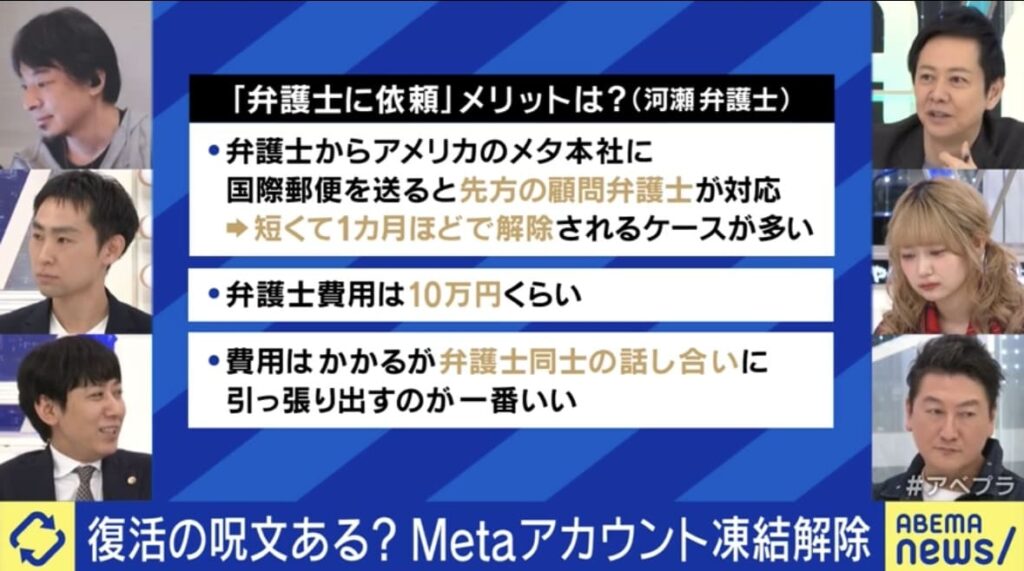
However, if there has been no violation of the terms, engaging a lawyer can sometimes lead to negotiations with Meta’s in-house counsel and the unlocking of a suspended or frozen Facebook or Instagram account. In such cases, it may be possible to have the account unlocked in as little as one month.
If you are troubled by a Meta account suspension or freeze that prevents you from using Facebook or Instagram, we recommend consulting with a lawyer.
Summary: Proactive Measures for Social Media Account Suspension and Freezing Are Now Essential
In today’s digital age, a social media account is essentially the media platform for influencers, and having it suspended or frozen equates to a broadcasting shutdown—a significant loss. Moreover, the decision to suspend or freeze is at the discretion of a single company, such as Meta, and the effectiveness of filing an objection is extremely limited.
In such circumstances, it is not post-incident response but rather “proactive strategy design” that becomes the most important risk hedge. In particular, it is essential to formalize and habitualize the following three points:
- Understanding and instructing on the tendencies of posts that are likely to be recognized as violations of terms of service
- Designing and sharing post formats that are less likely to be judged as spam
- Establishing a post-check system and a prepared flow for filing objections
It is too late to start responding at the moment of suspension or freezing. Right now, setting up a “design for posts that avoid suspension or freezing” and “procedures for responding when suspended” has become indispensable for professional social media management.
Guidance on Measures Provided by Our Firm
Monolith Law Office is a law firm with extensive experience in both IT, particularly the internet, and legal matters. Recently, the need for legal checks, including rights to likeness, copyright, and advertising regulations, has surged among YouTubers and VTubers in managing their channels. Please refer to the article below for more details.
Areas of practice at Monolith Law Office: YouTuber & VTuber Legal Services
Category: Internet






